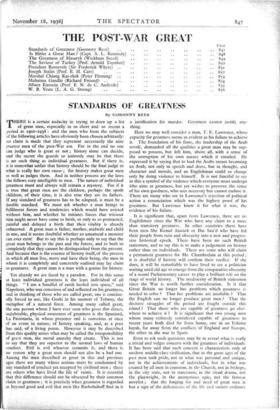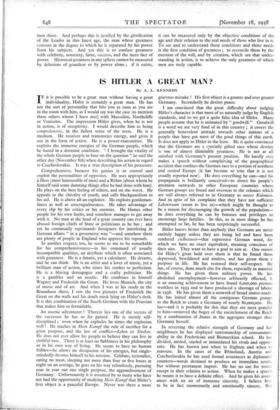STANDARDS OF GREATNESS
THE POST-WAR GREAT
By GORONWY REES
THERE Is a certain audacity in trying to draw up a list of great men, especially in so short and so recent a period as '192o-4938 : and the men who form the subjects of the following articles have obviously been chosen arbitrarily: no claim is made that they represent necessarily the nine greatest men of the post-War era. For in the end no one can judge who is great or not ; history alone can decide, and the secret she guards so jealously may be that there is no such -thing as individual greatness. But if there is, it is somewhat unfair that history should be the final judge in what is really her own cause ; for history makes great men as well as judges them. And in neither process are the laws she follows very intelligible to men. The nature of individual greatness must and always will remain a mystery. For if it is true that great men are the children, perhaps the spoilt children, of their time, it is also true they are its fathers. If any standard of greatness has to be adopted, it must be a double standard. We must ask whether a man brings to fulfilment forces and tendencies which would have existed without him, and whether he initiates forces that without him might never have come to birth, or only to so protracted, painful and,. delayed a birth that their vitality is already 1 exhausted. - A great man is father, mother,,midwife and child in one, and it seems doubtful whether so unnatural a monster can ever exist: But to say this is perhaps only to say that the great man belongs to the past and the future, and to both so completely that they cannot be distinguished from the present. And because that is the essence of history itself, of the process in which all men live, move and have their being, the men in whoni it is completely and concretely realised may lay claim to greatness: A great man is a man with a genius for history.
Yet already we are faced by a paradox. For in this sense at least individual greatness is the least individual of all things. " I am a handful of earth hurled into space," said Napoleon;who was"conscious of and reflected on his greatness, and in thinking of those who are called "great; one is continu- ally forced to use, like Gorki in his memoir of Tolstoy, the metaphor of a natural force. Among many called great, the one person whom I have ever seen who gives this direct, indubitable, physical awareness of greatness is the Spaniard, La Pasionaria, in whose presence one is conscious at once of an event in nature, of history speaking, and, as a poet has said, of a living poem. However it may be described from this quality arises what may be called the. irresponsibility of great men, the moral anarchy they create. This is not to say that they are superior to the normal laws of human conduct. Evil is evil whoever commits it, and there is no reason why a great man should not also be a bad one. Among the men described as great in this and previous ages there are many whose actions must be condemned by any standard of conduct yet accepted by civilised men ; there are others who have lived the life of saint's. It is essential that this difference should not be obscured by their common claim to greatness ; it is precisely when greatness is regarded as beyond good and evil that men like-Raskolmioff find in it a justification for murder. Greatness cannot justify any- thing.
Here we may well consider a man, T. E. Lawrence, whose capacity for greatness seems as evident as his failure to achieve it. The foundation of his fame, the leadership of the Arab revolt, demanded all the qualities a great man may be sup- posed to possess, but left him, above all, with a sense of the corruption of his own nature which it entailed. He expressed it by saying that to lead the Arabs meant becoming an Arab, not only in speech and dress, but in thought, and character and morals, and an Englishman could so change only by doing violence to himself. It is not fanciful to see in this a symbol of the violence which everyone must undergo who aims at greatness, but yet wishes to preserve the sense of his own goodness, who sees necessity but cannot endure it. There are many who see in Lawrence's rejection of political action a renunciation which was the highest proof of his greatness. But Lawrence knew it for what it was, the evidence of his failure.
It is significant that, apart from Lawrence, there are no Englishmen since the War who have any claim to a more than transitory greatness. In other countries there have been men like Kemal Atatiirk or Ibn Sau'd who have led their people from ruin and obscurity into a new and progres- sive historical epoch. There have been no such British statesmen, and to say this is to make a judgement on history rather than on individuals. There are some who will claim a permanent greatness for Mr. Chamberlain at this period ; it is doubtful if history will confirm their verdict:- If she does, it will be remarkable to have lived to see a politician waiting until old age to emerge from the comparative obscurity of a sound Parliamentary career to play a brilliant role on the stage of world history. The mediocrity of British statesmen since the War is worth further consideration. Is it that Great Britain no longer has problems which greatness is needed to solve ? That her problems are insoluble ? That the English can no longer produce great men ? That the decisive struggles of the period are fought outside this island ? That those who are capable of greatness go else- where to achieve it ? It is significant that two young men whom many seriously considered capable of greatness in recent years both died far from home, one in an Eskimo kayak, far away from the conflicts of England and Europe, the other in the war in Spain.
Even to ask such questions may be to reveal what-is really a trivial and vulgar concern with the greatness of individuals. It has been said that such concern is characteristic only of modern middle-class civilisation, that in the great ages of the past men took pride, not in what was personal and unique, not in the achievements of individuals, but in what was created by all men in common, in the Church, not in bishops, in The city state, not in statesmen, in the ritual drama, not the playwright, in the anonymous epic, not the famous novelist ; that the longing for and need of great men is but a sign of the deficiencies of the life and society ordinary men share. And perhaps this is justified by the glorification of the Leader in this latest age, the man whose greatness , consists in the degree to which he is separated by his power from his subjects. And yet this is to confuse greatness with celebrity, notoriety, fame, success, and the mere fact of power. Historical greatness in any sphere cannot be measured by delusions of grandeur or by power alone ; if it exists, it can be measured only by the objective conditions of the age and their relation to the real needs of those who live in it. To see and to understand those conditions and those needs is the first condition of greatness ; to reconcile them by the exertion of the will, and by creation, which are that under- standing in action, is to achieve the only greatness of which men are truly capable.

























































 Previous page
Previous page